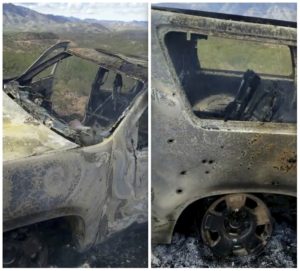It’s War, Not Hollywood
"Off to War" shows real soldiers and their families struggling to deal with the U.S. occupation of Iraq.Somewhere in the midst of Craig and Brent Renaud’s documentary “Off to War,” things go terribly awry.
Although the discomfort builds early in the 10-part series, one still gets the feeling that everything will turn out for the best. After all, the show has the makings of a Hollywood movie: Despite a resourceful and elusive enemy, simplistically optimistic officers, and enlisted men who only care about making it home, the presence of that American flag on the soldiers’ right sleeve makes it seem inevitable that they’ll come out unscathed and victorious. It’s not until the sixth episode that reality strikes in the form of four rocket-propelled grenades and a 12-minute ambush instigated by treacherous Iraqi police. Real war doesn’t make good Hollywood pictures. There are no heroes, only men performing heroic acts despite their own fear, contempt and anger. The soldiers of the Arkansas National Guard aren’t lionized, and that honesty is what makes this series stand out.
The series follows Arkansas’ 239th Engineer Company in what was the largest call-up of the National Guard in more than 50 years. What is so unusual about “Off to War” is that it simultaneously follows the family members left behind, showing the evolution of relationships that is unavoidable during an 18-month deployment.
The first episodes focus on introducing the soldiers and showing their preparation and subsequent deployment. What is immediately apparent is the lack of experience in their company. Often the first phrase they hear when they reach their duty station is “forget everything you learned in basic training.” Most Guard units don’t have either the budget or experienced cadre of noncommissioned officers to continue training citizen soldiers in their occupation specialty. Midway through the second episode, during mock combat at a joint readiness training center, the “enemy” uses the Guardsmen’s own machine guns against them, chaos ensues, and one can’t help but get the feeling that these men don’t have the experience to patrol effectively in Iraq.
Sooner or later they adapt, however, and after arriving in Iraq and taking several casualties the soldiers do become effective, but it feels like a constant game of catch-up in which the soldiers themselves are left on their own performing a mission they weren’t adequately prepared or equipped for.
Perhaps the most illuminating scenes in “Off to War” are the ones in which individuals constantly repeat: “I don’t want to believe this is all for nothing, I won’t accept that.”
By the end, they have discovered that Iraq had nothing to do with the World Trade Center bombings. And the mounting casualties, physical and emotional, have taken their toll on morale. The soldiers become increasingly disgruntled with their mission and with the sincerity of the Iraqi people who surround them daily. Specialist Matt Hertlein and other lower enlisted soldiers repeatedly state that they dislike the locals. That the Iraqis only want to see them dead, that none of them can be trusted. It’s a feeling I myself had.
The Renaud brothers aren’t there to give a slant to the film, and they give equal face time to the soldiers who believe in the mission, mainly First Lieutenant Brian Mason, who points to an Iraqi child and talks about him growing up with a future. But the speech is remote and hardly believable after watching the Iraqi faces flush with a strange concoction of apathy and hatred.
One thing becomes abundantly clear in this stunning production. The war in Iraq is different from any operation that has ever been attempted. Soldiers have the Internet in their rooms, allowing instant communication and knowledge of current affairs that were unheard of in prior wars. They’re fighting an enemy that is increasingly effective in a war of attrition and disruption.
Detractors may say that these Arkansas Guardsmen don’t represent the American military. But they do. From 40 to 50% of deployed service members are reservists or National Guardsmen, torn from their families and lives for as much as 18 months to fight a war they are under-trained and ill-equipped for.
Still they persevere, like the soldiers they are, if not with the strident optimism of Washington then with the nihilistic demeanor of Sergeant Croft in Norman Mailer’s “The Naked and the Dead” when he says:
“Waste of time thinking about it [home]. The war’ll go on for a while.”
Watch: ![]() Video Gallery
Video Gallery
Independent journalism is under threat and overshadowed by heavily funded mainstream media.
You can help level the playing field. Become a member.
Your tax-deductible contribution keeps us digging beneath the headlines to give you thought-provoking, investigative reporting and analysis that unearths what's really happening- without compromise.
Give today to support our courageous, independent journalists.


You need to be a supporter to comment.
There are currently no responses to this article.
Be the first to respond.